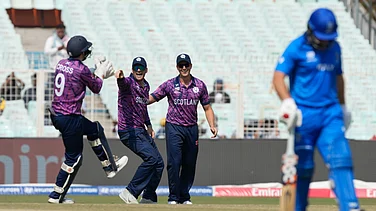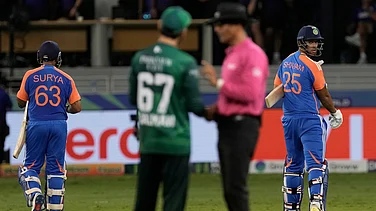If you had an Azharuddin poster at Eden Gardens on March 13 when Indian wickets were falling like ninepins, you were a marked man. Ask Mohammed Illyas, 17, who had bought onefor Rs 10. He was slapped and roughed up, and the snatched from him and burnt. Amidst comments mathata ghooriye diyechey (Bijlani has screwed his brains up)".
Sometimes some things go wrong. For the Mohammed Azharuddin made them go wrong by field first. The decision baffled bookies, experts, and fans across India. While the odds on India opened at 75 morning, they went up to 9-10 as soon as Azhar elected to field.
Of course, most of this was in hindsight. For those in the stadium, the match was almost won when Javagal Srinath got the two in-form Sri Lankan openers in the first over. Aravinda De Silva's stunning counter-attack in back-to-the-wall circumstances wasn't for the most part taken as a threat. Nobody wanted a no-contest.
Says Peter Roebuck, former Somerset captain and cricket writer: "Azhar's decision to field first was a very bad mistake. The wicket started turning square in the second session. And the Indian bowling, barring Kumble's, is very ordinary. Srinath, despite his wickets, didn't bowl well." Roebuck, in fact, was one of the few who gave Sri Lanka even odds just before the Indian openers went out to bat and regrets he didn't list the nation as one of the favourites in his Cup preview.
"That their openers got out the way they did shouldn't deter them. It's good, aggressive cricket. Whenever Kerry Packer saw Geoff Marsh play, he always used to ask why the opener only fiddled around instead of hitting out."
Another man who rated the Lankans high was Derek Pringle, former England all-rounder. "If they get Sachin before India touches 100, they're in with a chance." Tendulkar went with the score at 98 in the 23rd over. In another 11.1 overs, six more Indian wickets fell for just 22 runs. Said Pringle after the match: "Initially, the Lankan spinners were bowling around middle to Sachin and he worked them easily. Then they switched their line to off and he had to slow down. While Sachin was there, people forgot Manjrekar was finding it hard to score."
While Azhar's decision had all foxed, none was more than Eden Gardens' curator Maheshwar Sahu. Says he: "I had watered the pitch to slow it down and had warned the team the ball would turn a lot in the second session. I thought they appreciated my advice but they went and did the opposite." Former India opener Arun Lal was even critical of the Cricket Association of Bengal for not allowing a practice match on the newly laid-out pitch to see how it would behave. Says Lal: "They said it would spoil the outfield."
For the crowd, Ashish Kapoor's scoop to mid-on off Muralitharan was the point where it was not enough to express anguish with shouts of hai hai . There had to be a physical let-up of the frustration and, with only mineral water bottles around that could be spared and hurled any respectable distance, the grounds and cops became easy targets. Targets which couldn't get back to you because of the fence. Starting in the stand opposite the clubhouse, bottles started flying towards the green from all over, a solitary one making its way even from the clubhouse end—the culprit exited after his neighbours tried handing him over to the cops.
Says Chayan Mehra, 27, an Eden Gardens regular: "I have never seen such unruly behaviour. And there were no public announcements telling the crowds to behave. No Indian player tried it either. It would have made a difference despite their performance." Mehra and others, sitting in the lower tiers of D-block, had to leave the stadium because bottles from the upper tiers started landing amidst them. While the disturbance was the handiwork of just 200-odd people, the shame felt by nearly all in the stadium was tremendous. Says Arup Chatterjee, 35, who couldn't contain his tears at what was happening: "I used to think these kind of things happen only in Pakistan. What face do we have now?"
BBC commentator Christopher Jenkins was more charitable: "Well, it shouldn't have happened. But it was really a mild form of what goes on with, say, British football hooligans." But the last word goes to Geoff Boycott: "It was a sad end to a great occasion. Not all were hooligans or bad losers, but those who caused the trouble, and brought shame to a great sporting city, certainly were."






















